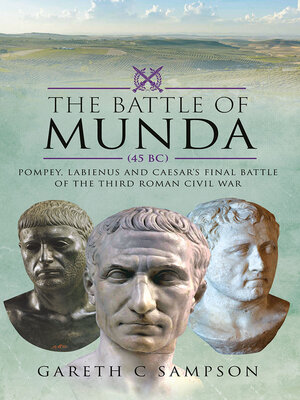The Battle of Munda (45 BC)
ebook ∣ Pompey, Labienus and Caesar's Final Battle of the Third Roman Civil War
By Gareth C Sampson

Sign up to save your library
With an OverDrive account, you can save your favorite libraries for at-a-glance information about availability. Find out more about OverDrive accounts.
Find this title in Libby, the library reading app by OverDrive.



Search for a digital library with this title
Title found at these libraries:
| Library Name | Distance |
|---|---|
| Loading... |
The battle of Munda was Julius Caesar's final victory, analyzing tactics, commanders, and the aftermath leading to his downfall.
After four years of fighting and two major victories, Julius Caesar had the upper hand in the Third Roman Civil War and had control of Rome itself. Yet despite this success, his surviving opponents still fought on, with the two sons of Pompeius Magnus taking command of the war against Caesar, along with Titus Labienus, previously one of Caesars’ own trusted subordinates. This opposition made another stand at Munda in Spain, which proved to be the final battle of Caesar’s career, and the closest he came to defeat.
Gareth Sampson describes the campaigns that set the context for the battle and analyses in detail the opposing commanders and their forces, their relative strengths and weaknesses, organization, equipment, and tactics. The battle itself is recounted in detail through its various phases before considering the aftermath of the victory which saw Caesar’s victory unravel almost immediately, leading to his downfall on the Ides of March.
After four years of fighting and two major victories, Julius Caesar had the upper hand in the Third Roman Civil War and had control of Rome itself. Yet despite this success, his surviving opponents still fought on, with the two sons of Pompeius Magnus taking command of the war against Caesar, along with Titus Labienus, previously one of Caesars’ own trusted subordinates. This opposition made another stand at Munda in Spain, which proved to be the final battle of Caesar’s career, and the closest he came to defeat.
Gareth Sampson describes the campaigns that set the context for the battle and analyses in detail the opposing commanders and their forces, their relative strengths and weaknesses, organization, equipment, and tactics. The battle itself is recounted in detail through its various phases before considering the aftermath of the victory which saw Caesar’s victory unravel almost immediately, leading to his downfall on the Ides of March.







